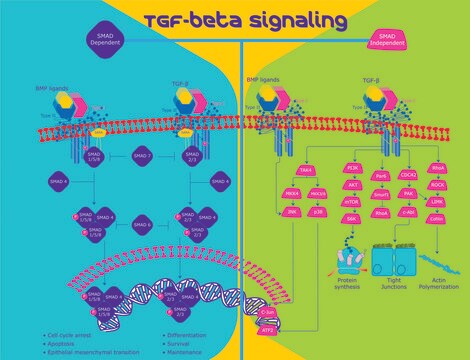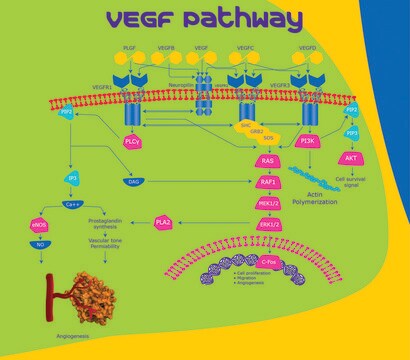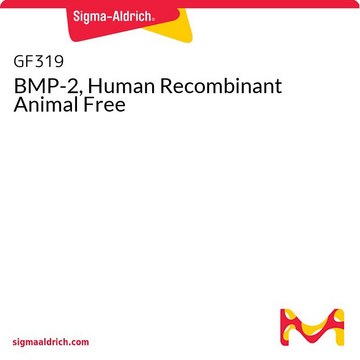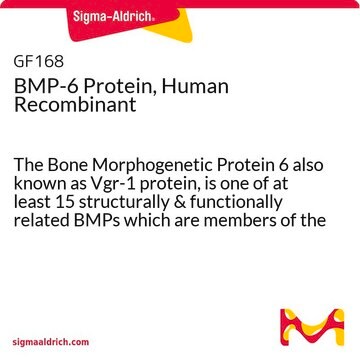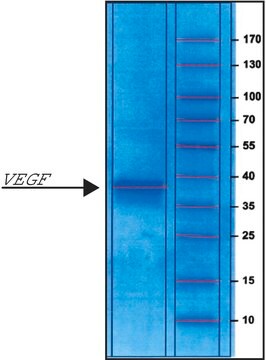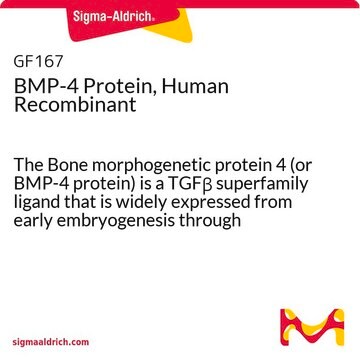GF166
BMP-2 Protein, Human Recombinant
The Human Bone morphogenetic protein 2 (or BMP-2 protein) is a member of the BMP protein subgroup of the TGFβ superfamily.
Sinónimos:
Bone Morphogenetic Protein 2, BMP2, BMP-2A
Iniciar sesiónpara Ver la Fijación de precios por contrato y de la organización
About This Item
Código UNSPSC:
12352202
eCl@ss:
32160405
NACRES:
NA.77
Productos recomendados
Descripción general
Bone morphogenetic protein 2 (BMP-2) is a member of the BMP subgroup of the TGFβ superfamily. It plays a dominant role in embryonic dorsalventral patterning, organogenesis, limb bud formation, and bone formation and regeneration. BMP-2 is a potent osteoinductive cytokine, capable of inducing bone and cartilage formation in association with osteoconductive carriers such as collagen and synthetic hydroxyapatite. In addition to its osteogenic activity, BMP-2 plays an important role in cardiac morphogenesis and is expressed in a variety of tissues including lung, spleen, brain, liver, prostate ovary and small intestine. The functional form of BMP-2 is a 26 kDa protein composed of two identical 114 amino acid polypeptide chains linked by a single disulfide bond. Each BMP-2 monomer is expressed as the C-terminal part of a precursor polypeptide, which also contains a 23 amino acid signal sequence for secretion, and a 259 amino acid propeptide. After dimerization of this precursor, the covalent bonds between the propeptide (which is also a disulfide-linked homodimer) and the mature BMP-2 ligand are cleaved by a furin-type protease. Recombinant human BMP-2 is a 26.0 kDa homodimeric protein consisting of two 115 amino acid polypeptide chains.
Product Source: E. coli.
Especificidad
Cross Reactivty
Mouse, Rat, Rabbit, Cow, Dog, Monkey
Mouse, Rat, Rabbit, Cow, Dog, Monkey
Aplicación
Research Category
Stem Cell Research
Stem Cell Research
Research Sub Category
Growth Factors & Receptors
Growth Factors & Receptors
Calidad
Bioactivity assay: Determined by its ability to induce alkaline phosphatase production by ATDC-5 cells. The expected ED50 for this effect is 0.5-1.0 μg/ml.
Forma física
Product is filtered through a 0.2 micron filter before lyophilization.
Almacenamiento y estabilidad
Store at -20°C for up to 6 months from date of receipt.
Cláusula de descargo de responsabilidad
Unless otherwise stated in our catalog or other company documentation accompanying the product(s), our products are intended for research use only and are not to be used for any other purpose, which includes but is not limited to, unauthorized commercial uses, in vitro diagnostic uses, ex vivo or in vivo therapeutic uses or any type of consumption or application to humans or animals.
Código de clase de almacenamiento
11 - Combustible Solids
Clase de riesgo para el agua (WGK)
WGK 1
Punto de inflamabilidad (°F)
Not applicable
Punto de inflamabilidad (°C)
Not applicable
Certificados de análisis (COA)
Busque Certificados de análisis (COA) introduciendo el número de lote del producto. Los números de lote se encuentran en la etiqueta del producto después de las palabras «Lot» o «Batch»
¿Ya tiene este producto?
Encuentre la documentación para los productos que ha comprado recientemente en la Biblioteca de documentos.
Los clientes también vieron
Nuestro equipo de científicos tiene experiencia en todas las áreas de investigación: Ciencias de la vida, Ciencia de los materiales, Síntesis química, Cromatografía, Analítica y muchas otras.
Póngase en contacto con el Servicio técnico